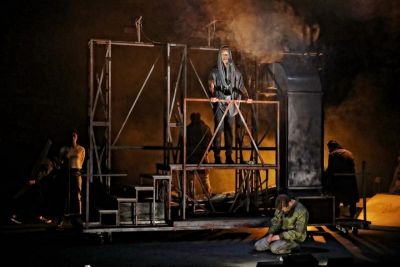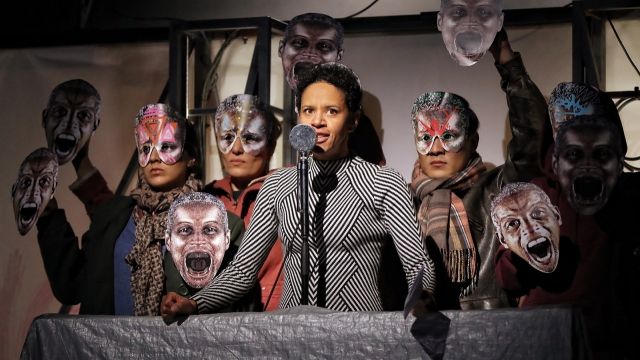Julius Caesar
There are few plays that are as relentlessly modern as Julius Caesar. There are so many lines that have entered our language; the idea of bringing down an “ambitious” leader feels so very contemporary. With a diverse cast and some male roles - including Mark Antony - played by women, it feels even more so in this Bell Shakespeare production, now concluding a 28-venue national tour.
The director James Evans tells the audience on this latest opening night that he’s deliberately steered away from dressing the characters in suits. That’s often done these days but instead he’s gone for a dystopian world. The scene here, however, is a dull one: the large billboard scaffolding set is disappointing, not creating any sense of place. The grunge costumes are underwhelming, as if the cast has forgotten to change.
With this set-up, it’s left to the actors - and their director - to make the play soar. But even with such strong Shakespeare, they falter. Some of the actors, particularly those playing smaller parts, seem to struggle with the language, giving a sense that they’re always performing rather than feeling it. Many of the players lack gravitas.
 There are some powerful moments, particularly when Mark Antony (Sara Zwangobani) breaks down over Caesar’s corpse (though in a decision that robs the scene of impact, the corpse is covered in a tarpaulin so we don’t see the actual corpse).
There are some powerful moments, particularly when Mark Antony (Sara Zwangobani) breaks down over Caesar’s corpse (though in a decision that robs the scene of impact, the corpse is covered in a tarpaulin so we don’t see the actual corpse).
Caesar’s death is shocking, with a foreboding sense of doom as his plotters encircle him. It would be even more impactful if the slowed, stylised choreography was removed or changed. But there are good creative decisions too: the use of Caesar’s blood on the billboard and the killers’ hands provokes a visceral reaction to his murder.
James Lugton and Nick Simpson-Deeks are the most impressive as Brutus and Cassius. Brutus and Mark Antony’s speeches are well done. It’s a bold decision to put the interval just after the words “friends, Romans, countrymen” and return to the full monologue after the break. But that works.
It’s great to see the continuing resonance of Julius Caesar after 400 years. But this production does not do it justice. This play about power lacks enough power for the audience.
Peter Gotting
Photographer: Prudence Upton
Subscribe to our E-Newsletter, buy our latest print edition or find a Performing Arts book at Book Nook.

